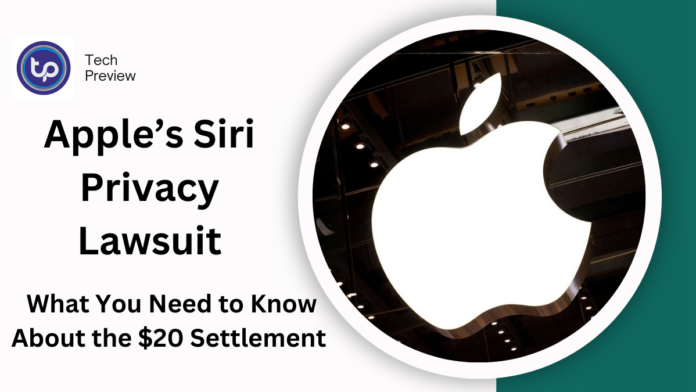This week’s security news is filled with significant updates, including potential legal action involving Apple and Siri, a large discovery of homemade explosives by the FBI, and new revelations surrounding the hack of the US Treasury Department by China.
These events serve as stark reminders of the need for stronger cybersecurity, privacy protections, and national security measures in today’s digital world.
Apple’s Potential $20 Settlement in Siri Privacy Lawsuit
Apple is facing legal action over privacy concerns regarding its virtual assistant, Siri. The lawsuit alleges that Apple unlawfully recorded and stored users’ private conversations through Siri, often without their knowledge. Now, Apple may be required to pay up to $20 to affected users as part of a settlement in the case.
MUST READ: Cyberattack on U.S. Treasury Department: The Growing Threat of State-Sponsored Hacking
Key Details of the Siri Privacy Lawsuit
- Claim: Apple is accused of secretly recording private conversations via Siri and storing them in a manner that violated users’ privacy.
- Recording: Some users were unaware that their conversations were being recorded, even when Siri was not actively in use.
- Human Review: Apple contractors reportedly listened to the recorded interactions to improve Siri’s performance.
Potential Settlement
If the settlement is approved, eligible users could receive compensation of up to $20 each. While the specifics of the eligibility criteria are still being worked out, the settlement marks a major move in holding tech companies accountable for how they handle user data.
How to File a Claim
Once finalized, Apple will release specific instructions for users to file claims. Those who are eligible will be able to request their share of the settlement.
Why Does This Matter?
This lawsuit is a pivotal moment in the ongoing debate about privacy rights in the digital age. It underscores the growing need for tech companies to be transparent about how they collect and use user data. As digital assistants and voice-activated devices continue to become more ubiquitous, this case sets an important precedent for the industry.
FBI Discovers Historic Cache of Homemade Explosives
In a shocking discovery this week, the FBI unearthed a vast collection of homemade explosives as part of an ongoing investigation into domestic terrorism.
The find has been described as one of the largest of its kind in U.S. history. The explosives, which were carefully constructed, have raised concerns about the threat posed by individuals or groups using homemade devices to carry out violent attacks.
Key Facts about the FBI’s Explosive Discovery
- Location: The explosives were found in a secure location, though details on the site remain limited.
- Quantity: The discovery includes a large variety of homemade explosive devices, some capable of causing massive destruction.
- Terrorism Link: The FBI’s investigation is centered on domestic terrorism, indicating a potentially wider threat from extremist groups.
Homemade Explosives: A Growing Threat
Homemade explosives, often referred to as improvised explosive devices (IEDs), are becoming increasingly common in terrorist and criminal activities. They are difficult to detect and, in some cases, easy to produce using common materials.
Why Are Homemade Explosives Dangerous?
- Accessibility: IEDs can be made from common household items and chemicals, making them widely available.
- Unpredictability: Because they are homemade, IEDs can be tailored to target specific locations or people.
- Effectiveness: Despite being homemade, IEDs can cause massive casualties and widespread damage, as evidenced in past attacks.
The FBI’s discovery points to the growing risk posed by domestic terrorism groups who are using these devices as weapons. It also highlights the challenges law enforcement faces in tracking and preventing the use of homemade explosives.
New Revelations in the China Hack of the US Treasury Department
In another major cybersecurity story this week, new revelations have emerged regarding the hack of the US Treasury Department. The breach, attributed to China, exposed sensitive government data and raised serious concerns about the state of cybersecurity at the highest levels of the U.S. government.
Key Details about the US Treasury Hack
- Breach Date: The attack, known as the SolarWinds hack, was first detected in late 2020 but has continued to reveal new information.
- Scope: The hackers gained access to a wide range of government systems, including communications and documents from the Treasury Department.
- Attack Method: The breach involved exploiting vulnerabilities in a widely used software tool, SolarWinds, allowing the hackers to infiltrate government networks undetected.
What Was Stolen?
The attackers were able to access sensitive data, including:
| Type of Data Accessed | Implications |
| Government Communications | Potential access to classified government talks |
| Financial Records | Risk of exposing sensitive financial operations |
| Foreign Policy Documents | Potential for espionage and geopolitical leverage |
Ongoing Concerns
- Data Exposure: The breach exposed the U.S. government to potential espionage and compromise of sensitive diplomatic and national security information.
- Security Gaps: The attack also raised questions about the vulnerability of government agencies and their cybersecurity defenses.
Response and Reactions
In response to the breach, U.S. officials have been working on strengthening cybersecurity measures across all government departments. The SolarWinds hack has become a key catalyst for ongoing discussions about improving national cybersecurity infrastructure and how to better protect sensitive government information from foreign cyber threats.
Conclusion
This week’s security news highlights the growing threats that individuals and governments face in the digital world.
From Apple’s potential $20 Siri settlement to the FBI’s discovery of homemade explosives and the ongoing China-linked cyberattack on the US Treasury Department, the need for heightened vigilance in both cybersecurity and data privacy has never been more urgent.
As these events unfold, it is clear that governments, corporations, and individuals must work together to build stronger defenses against the ever-evolving digital threats we face today.
In particular, tech companies must be held accountable for how they handle user data, while government agencies must continue to bolster their defenses to safeguard against cyberattacks from foreign adversaries.
People May Ask
1. Who is eligible for compensation in the Apple Siri lawsuit?
Users who interacted with Siri and believe their privacy was violated by the recording of their conversations may be eligible for compensation. The specific eligibility criteria will be finalized once the settlement is approved.
2. How can I file a claim for the Siri settlement?
Once the settlement is finalized, Apple will provide instructions on how users can file claims and receive compensation. Keep an eye on official announcements from Apple for further details.
3. What were the homemade explosives discovered by the FBI intended for?
While the specific intentions behind the explosives are still under investigation, the discovery is believed to be linked to domestic terrorism activities. The explosives were part of a larger investigation into extremist groups planning violent attacks.
4. How serious is the China hack of the US Treasury?
The China-linked hack is considered highly serious because it exposed critical government communications and sensitive information. The breach raises significant concerns about national security, espionage, and the vulnerability of U.S. infrastructure to foreign cyber threats.
Click here to learn more.








